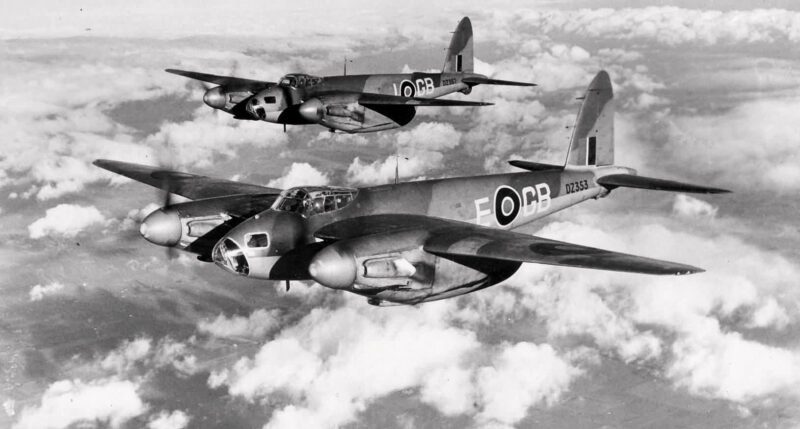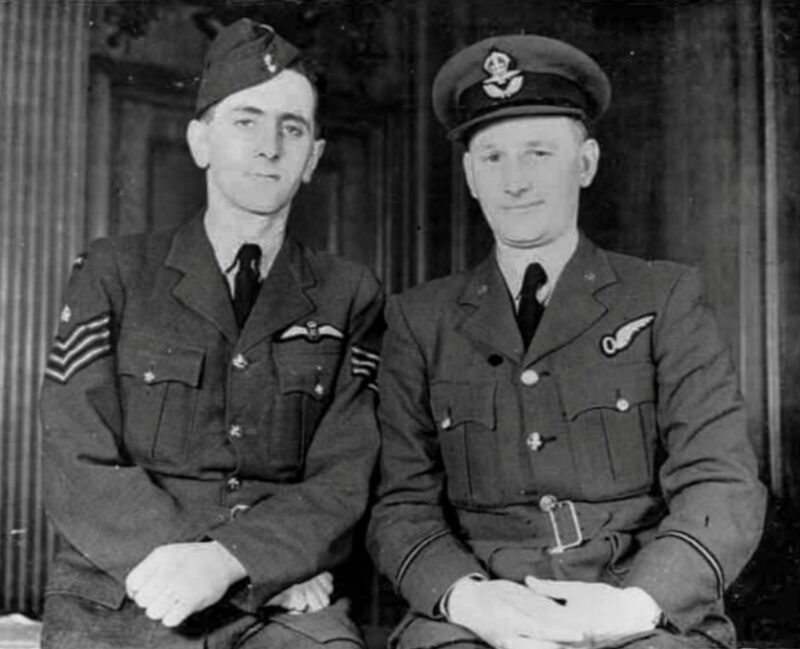Operations
Operations
Mosquitos to Berlin – 1943
The De Havilland Mosquito was a remarkable aircraft, probably the most versatile of those in RAF service, in Bomber Command or elsewhere. The ‘wooden-wonders’ undertook a variety of roles – bomber, pathfinder, night-fighter, strike fighter, photo reconnaissance and more.
NZBCA member John Beeching will remind anyone that Mosquitos flew into Germany, to Berlin and beyond. Their capability to strike deep into enemy territory was well demonstrated in a remarkable raid, eighty years ago, where they reflected the nature of their insect namesake – making a real nuisance of themselves.

105 Sqn Mosquito B.IVs DZ353 ‘GB-E’ (nearest) and DZ367 ‘GB-J’ (furthest away) in 1942.
DZ367 was subsequently transferred to 139 Sqn and was lost on the daylight raid against Berlin on 30th January 1943.
(Credit: Royal Air Force)
It was known to the RAF that Germany was planning to celebrate the tenth anniversary of Adolf Hitler’s rise to power on 30th January 1943. Rallies were scheduled for Berlin, with speeches to be broadcast to the Third Reich, first by Hermann Goering from the Air Ministry building, and later by Joseph Goebbels who would address a crowd of thousands assembled in the Schöneberg Sportpalast, Berlin’s biggest indoor meeting venue. Mosquito squadrons 105 and 139 (Jamaica) were tasked with spoiling the party.
That morning, three DH Mosquito B.IVs of 105 Squadron took off from RAF Marham, bound for Berlin, led by Squadron Leader Reginald ‘Reggie’ Reynolds with his navigator Pilot Officer Ted Sismore. The three Mosquitoes flew at wave top height across the North Sea, before climbing to 25,000 feet, in and out of cloud. They met no opposition and as they approached Berlin emerged into clear skies, descending to low level for the run in to the target, the headquarters of the German State broadcasting company. Despite having flown some 500 miles in difficult weather they were exactly on time.
As Goering began to speak, air raid warnings sounded in Berlin, anti-aircraft guns began to blast away and the sound of Merlin engines and exploding 500-lb bombs could be heard. The broadcast engineers shut down the transmission and listeners were instead treated to a scratchy recording of classical music for over an hour, before an apparently furious Goering was able to return to the microphone. The bombing itself was inaccurate and did little damage, but the effect was exactly what had been hoped for. All three Mosquitoes returned safely to Marham.
Then, in early afternoon, a further three Mosquitoes of 139 (Jamaica) Squadron also took off from Marham, led by Squadron Leader Donald Darling with his navigator Flying Officer Bill Wright in Mosquito DZ367. In support was Flight Sergeant Peter ‘Pete’ McGeehan RNZAF with Flying Officer Reg Morris in DK337.
As Goebbels stepped up to the lectern at the rally, the Mosquitoes arrived over Berlin in clear skies. This time, however, the defences were on full alert and sent up great fusillades of anti-aircraft fire. The radio broadcasting engineers stayed with Goebbels, who delivered his address punctuated by the faint sounds of bomb blasts, roaring Merlin engines and anti-aircraft fire. Like the earlier raid, the attack did little damage, but nonetheless created the desired effect.
Sadly, as the Mosquitoes raced away, one Mosquito was hit by ‘flak’ and crashed, killing both of the crew, Squadron Leader Donald Darling and Flying Officer Bill Wright. The other two Mosquitoes returned safely to Marham, having outrun some Luftwaffe Fw 190s which attempted to intercept them.
A press conference was held with the Mosquito crews at the Air Ministry in London the next day, when they were photographed and interviewed. Peter McGeehan said: “Some flak popped up at us, close enough to be unpleasant, but not hitting the aircraft. It promised to be persistent, so we dived down, setting off for home. As we were diving we saw two single-engine fighters heading towards us, but we were going so fast in the dive that they had no chance and we soon left them comfortably behind.
“We found cloud cover over Holland and as we passed over the Friesian Islands encountered light flak. The rest of the trip was uneventful. We reached base two minutes ahead of schedule and then went for interrogation. It was late when we got our tea, but it was steak and chips, which were worth flying to Berlin for.”

The Mosquito crews were interviewed and photographed by the press at the Air Ministry in London after the raid.
(L-R): Flt Sgt Peter McGeehan RNZAF and Fg Off Reg Morris.
Credit: Royal Air Force).
The five crews who made it back from this raid were all decorated, with McGeehan receiving the DFM. Sadly, of the 10 airmen who returned from this Berlin raid, five were killed later in the war. McGeehan and his navigator Morris were shot down by ‘flak’ near the Dutch island of Texel in a Mosquito on 16th March; both were killed.